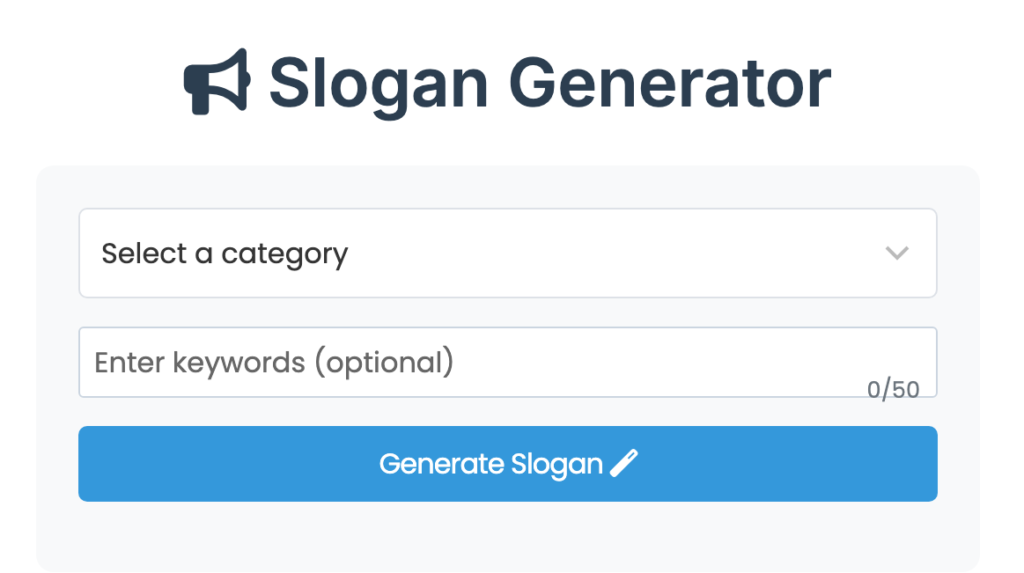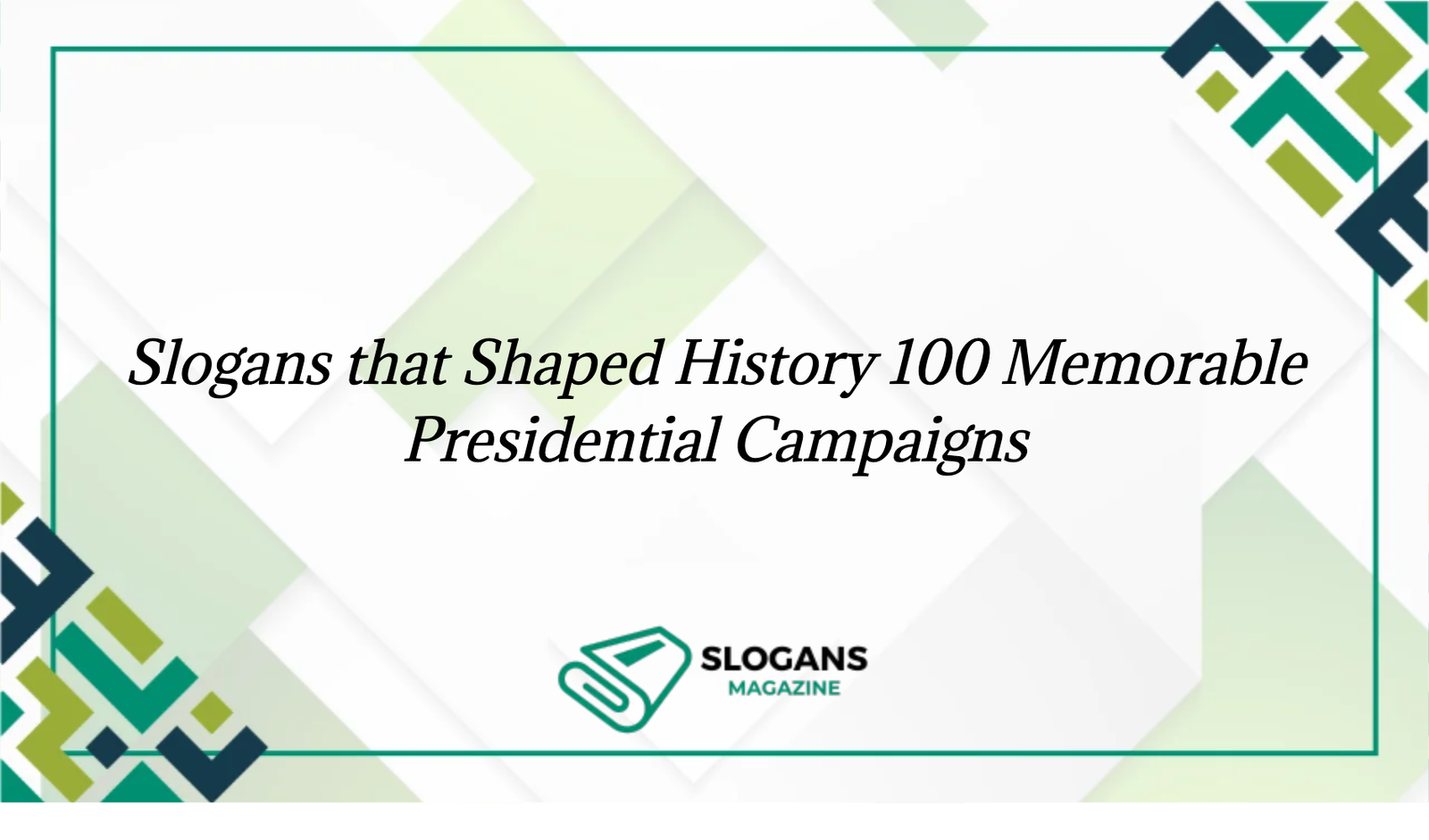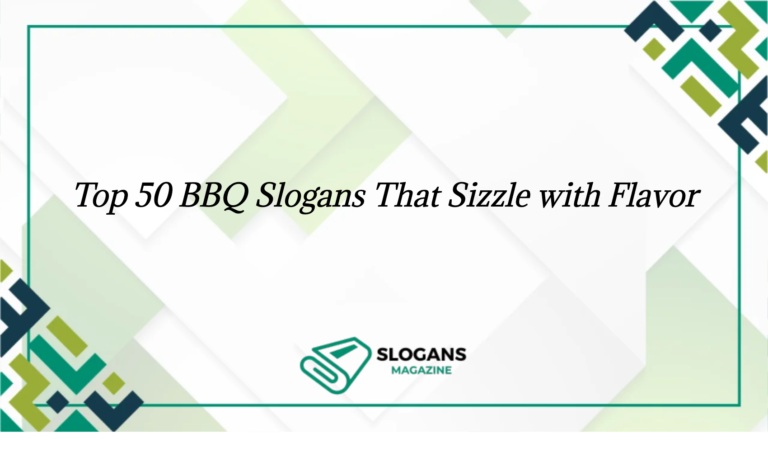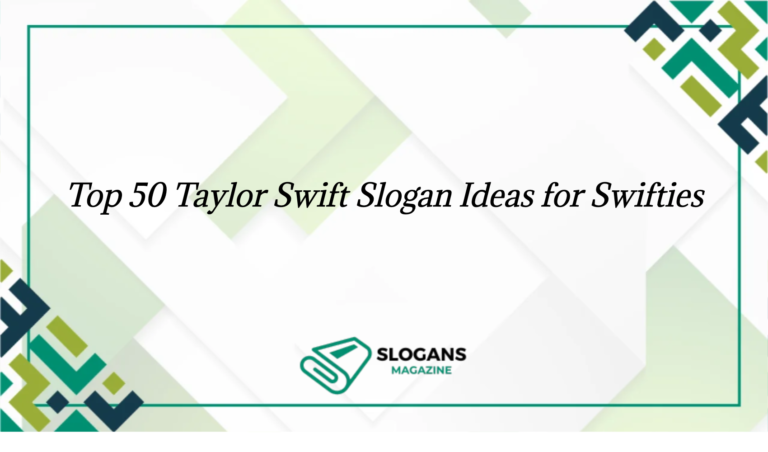Slogans that Shaped History 100 Memorable Presidential Campaigns
Presidential campaigns have always been a significant aspect of American history. From the earliest elections to the most recent, slogans have played an essential role in communicating a candidate’s message, values, and vision for the country. These short, memorable phrases can capture the essence of a campaign and leave a lasting impression on the electorate.
Top 50 Softball Slogans to Rally Your Team | Top 50 Snack Slogan Ideas for Tasty Treats
Celebrate in Style Top 50 40th Birthday Slogans that Spark Joy | Top 50 Irish Slogan Ideas for St. Patrick’s Day
For political science students and history enthusiasts, understanding these slogans provides valuable insights into the political landscape and societal issues of different eras. In this blog post, we’ll explore 100 of the most memorable presidential campaign slogans, with a detailed analysis of the top 10. By the end, you’ll have a deeper appreciation of how these slogans have shaped presidential races and influenced voter perceptions.
Top 10 Unique Presidential Slogans with In-depth Explanations
1. “Tippecanoe and Tyler Too” – William Henry Harrison (1840)
This slogan is one of the earliest and most famous in American political history. It refers to Harrison’s military victory at the Battle of Tippecanoe and his running mate, John Tyler. The slogan was catchy and emphasized Harrison’s strength and leadership. It also highlighted Tyler, helping to solidify the ticket in voters’ minds.
2. “He Kept Us Out of War” – Woodrow Wilson (1916)
During Wilson’s re-election campaign, the world was engulfed in World War I. This slogan reassured voters that Wilson’s leadership had kept the United States out of the conflict. It appealed to those who desired peace and stability. However, it’s worth noting that the U.S. entered the war shortly after Wilson’s re-election.
3. “A Chicken in Every Pot and a Car in Every Garage” – Herbert Hoover (1928)
This slogan epitomized the prosperity that Americans enjoyed during the 1920s. It promised continued economic growth and widespread affluence under Hoover’s leadership. While it resonated with many at the time, the Great Depression soon followed, tarnishing Hoover’s reputation.
4. “Happy Days Are Here Again” – Franklin D. Roosevelt (1932)
Roosevelt’s optimistic slogan came during the depths of the Great Depression. It conveyed hope and a promise of better times ahead. The cheerful, uplifting message resonated with a struggling populace and helped FDR secure a decisive victory.
5. “I Like Ike” – Dwight D. Eisenhower (1952)
Eisenhower’s slogan is one of the most iconic in American political history. Its simplicity and positive tone made it incredibly effective. The slogan capitalized on Eisenhower’s popularity as a World War II hero and portrayed him as a likable, trustworthy leader.
6. “All the Way with LBJ” – Lyndon B. Johnson (1964)
This slogan emphasized loyalty and full support for Johnson’s policies. It was a rallying cry for his supporters and conveyed a sense of unity and determination. The slogan helped Johnson secure a landslide victory against Barry Goldwater.
7. “It’s Morning Again in America” – Ronald Reagan (1984)
Reagan’s re-election campaign used this slogan to highlight the economic recovery and renewed sense of optimism under his leadership. It painted a picture of national rejuvenation and prosperity, resonating with voters who felt the positive changes in their lives.
8. “Change We Can Believe In” – Barack Obama (2008)
Obama’s slogan captured the desire for change and a break from the status quo. It was aspirational and conveyed a sense of hope and progress. The slogan helped galvanize a diverse coalition of voters and propelled Obama to a historic victory.
9. “Make America Great Again” – Donald Trump (2016)
Trump’s slogan tapped into a sense of nostalgia and promised to restore the country’s greatness. It resonated with voters who felt left behind by economic and social changes. The slogan became a powerful rallying cry for Trump’s supporters and played a significant role in his electoral success.
10. “Build Back Better” – Joe Biden (2020)
Biden’s slogan emphasized rebuilding and improving the nation after the challenges of the COVID-19 pandemic and economic downturn. It conveyed a forward-looking vision and a commitment to addressing pressing issues. The slogan resonated with voters seeking stability and progress.
Full List of 50 Unique Presidential Slogans
| Slogan | Description |
|---|---|
| A Full Dinner Pail | William McKinley (1896) |
| A Return to Normalcy | Warren G. Harding (1920) |
| A Time for Greatness | John F. Kennedy (1960) |
| America First | Woodrow Wilson (1916) |
| Believe in America | Mitt Romney (2012) |
| Compassionate Conservatism | George W. Bush (2000) |
| Cox and Cocktails | James M. Cox (1920) |
| Don’t Swap Horses in Midstream | Abraham Lincoln (1864) |
| Forward Together | Gerald Ford (1976) |
| Four More Years of the Full Dinner Pail | William McKinley (1900) |
| Give ’em Hell, Harry | Harry S. Truman (1948) |
| Hope and Change | Barack Obama (2008) |
| In Your Heart, You Know He’s Right | Barry Goldwater (1964) |
| Keep Cool with Coolidge | Calvin Coolidge (1924) |
| Let’s Make America Great Again | Ronald Reagan (1980) |
| Leave No Child Behind | George W. Bush (2004) |
| Peace and Prosperity | Dwight D. Eisenhower (1956) |
| Putting People First | Bill Clinton (1992) |
| Reformer with Results | George W. Bush (2000) |
| Restore Our Future | Mitt Romney (2012) |
| Stand Up for America | George Wallace (1968) |
| The Better Man for a Better America | Richard Nixon (1968) |
| The New Frontier | John F. Kennedy (1960) |
| Tippecanoe and Tyler Too | William Henry Harrison (1840) |
| We Can Do Better | John Kerry (2004) |
Why Choose Presidential Slogans?
Presidential slogans are more than just catchy phrases; they encapsulate a candidate’s message, values, and vision. They serve as rallying cries for supporters and can significantly influence voter perceptions. Understanding these slogans provides insights into the political strategies and societal issues of different eras. For political science students and history enthusiasts, studying these slogans offers a unique perspective on the evolution of American politics.
How to Create an Effective Presidential Slogan
Creating an effective presidential slogan requires understanding the candidate’s message, the electorate’s concerns, and the historical context. Here are some tips for crafting a compelling slogan:
- Keep It Short and Memorable:
- A slogan should be easy to remember and repeat.
- Aim for brevity without sacrificing clarity.
- Reflect the Candidate’s Core Message:
- Ensure the slogan aligns with the candidate’s values and key campaign themes.
- It should encapsulate the essence of the campaign.
- Appeal to Voters’ Aspirations:
- Focus on positive, forward-looking messages that inspire hope and confidence.
- Address the electorate’s desires and concerns.
Conclusion
Presidential slogans have shaped American political campaigns for centuries. They encapsulate the essence of a candidate’s message and leave a lasting impression on voters. From “Tippecanoe and Tyler Too” to “Build Back Better,” these slogans reflect the changing political landscape and societal values.
For political science students and history enthusiasts, studying these slogans offers valuable insights into the evolution of American politics. Whether you’re a campaign strategist, a history buff, or simply curious about political slogans, understanding their significance can provide a deeper appreciation of the art of campaigning.
Ready to create a slogan that sets your brand apart? Visit our Slogan Generator now to craft a unique and memorable slogan that captures your brand’s essence in just a few clicks. Whether you’re starting from scratch or refining an existing idea, our tool will help you find the perfect words to make a lasting impression.
FAQs
What makes a presidential slogan effective?
An effective presidential slogan is short, memorable, and reflective of the candidate’s core message. It should appeal to voters’ aspirations and address their concerns.
How have presidential slogans evolved over time?
Presidential slogans have evolved to reflect the changing political landscape and societal values. Early slogans often emphasized military achievements, while modern slogans focus on themes like hope, change, and economic prosperity.
Can a slogan make or break a presidential campaign?
While a slogan alone cannot determine the outcome of a campaign, it can significantly influence voter perceptions and rally support. A well-crafted slogan can encapsulate a candidate’s message and resonate with the electorate.
How do presidential slogans differ from campaign taglines?
While slogans and taglines serve similar purposes, slogans are often more concise and focused on a single message. Taglines, on the other hand, can be longer and provide additional context or detail.
Where can I find more examples of presidential slogans?
You can find more examples of presidential slogans in historical archives, political history books, and online resources dedicated to American political history.
Try Our slogan Generator
Give our Slogan Generator a spin today and watch as your perfect slogan comes to life before your eyes. Your next big marketing breakthrough could be just a click away!








